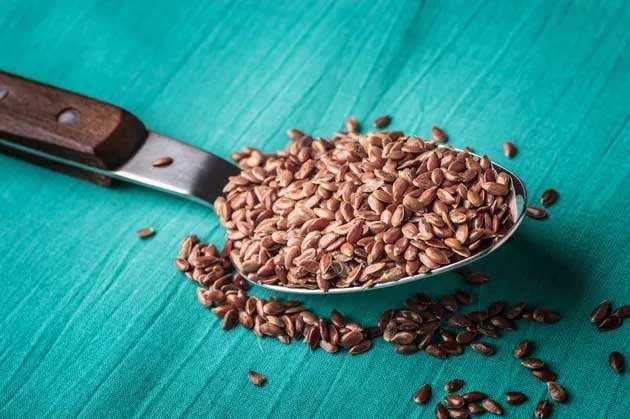
Flaxseed may help improve your cholesterol levels and lower your risk for heart disease and cancer, according to the University of Maryland Medical Center. These little seeds also have the potential to help make your menstrual cycle more regular and limit the side effects that sometimes occur during menstruation, although the evidence for this is still preliminary and conflicting.
Flaxseeds and Menstruation
Regularly eating flaxseeds may help make ovulation more regular. A study published in 1993 in “The Journal of Clinical Endocrinology and Metabolism” found that women who regularly ate flaxseed powder ovulated during every menstrual cycle, but when these women followed their regular low-fiber diet they didn’t ovulate during three out of 36 menstrual cycles. The phase of the menstrual cycle between ovulation and the start of the menstrual period, called the luteal phase, was also longer when the women consumed flaxseed powder. Having a short luteal phase is sometimes associated with infertility.
Limiting Cramps
If you typically have premenstrual symptoms, adding flaxseeds to your diet may help. An article on the Fitness magazine website notes that studies have shown adding a teaspoon or two of flaxseed to your diet each day may help reduce cramping during menstruation. The omega-3 fats provided by flaxseeds may help slow the release of substances called prostaglandins, which are often responsible for cramping during menstruation. A study published in the “American Journal of Obstetrics and Gynecology” in April 1996 found that taking an omega-3 supplement helped reduce menstrual pain compared to taking a placebo.
Reducing Breast Pain
Adding about 25 grams of flaxseed to your diet each day for three months may also limit the breast pain that women sometimes experience at the beginning of their periods, according to a study cited by MedlinePlus. A review article published in the “Journal of Obstetrics and Gynaecology Canada” in January 2006 backs up this recommendation, concluding that flaxseeds should be recommended as a treatment for this type of breast pain.
Other Considerations
Flaxseeds may interact with birth control medications, blood thinners, and diabetes medications, so check with your doctor before adding them to your diet. People with hormone-sensitive cancers, such as breast or ovarian cancer, should also check with their doctor before using flaxseed because it may change the levels of certain hormones and it may act like estrogen in your body.
References:
- Journal of Clinical Endocrinology and Metabolism: Effect of Flax Seed Ingestion on the Menstrual Cycle
- American Journal of Obstetrics and Gynecology: Supplementation With Omega-3 Polyunsaturated Fatty Acids in the Management of Dysmenorrhea in Adolescents
- Fitness: Menstrual Cramps
- MedlinePlus: Flaxseed
- University of Maryland Medical Center: Flaxseed
- Journal of Obstetrics and Gynaecology Canada: Mastalgia
- Medicine and Science in Sports and Exercise: Menstrual Disturbances in Athletes: A Focus on Luteal Phase Defects
Important Notice: This article was originally published at www.livestrong.com by Jessica Bruso where all credits are due.
Disclaimer
The watching, interacting, and participation of any kind with anything on this page does not constitute or initiate a doctor-patient relationship with Dr. Farrah®. None of the statements here have been evaluated by the Food and Drug Administration (FDA). The products of Dr. Farrah® are not intended to diagnose, treat, cure, or prevent any disease. The information being provided should only be considered for education and entertainment purposes only. If you feel that anything you see or hear may be of value to you on this page or on any other medium of any kind associated with, showing, or quoting anything relating to Dr. Farrah® in any way at any time, you are encouraged to and agree to consult with a licensed healthcare professional in your area to discuss it. If you feel that you’re having a healthcare emergency, seek medical attention immediately. The views expressed here are simply either the views and opinions of Dr. Farrah® or others appearing and are protected under the first amendment.
Dr. Farrah® is a highly experienced Licensed Medical Doctor certified in evidence-based clinical nutrition, not some enthusiast, formulator, or medium promoting the wild and unrestrained use of nutrition products for health issues without clinical experience and scientific evidence of therapeutic benefit. Dr. Farrah® has personally and keenly studied everything she recommends, and more importantly, she’s closely observed the reactions and results in a clinical setting countless times over the course of her career involving the treatment of over 150,000 patients.
Dr. Farrah® promotes evidence-based natural approaches to health, which means integrating her individual scientific and clinical expertise with the best available external clinical evidence from systematic research. By individual clinical expertise, I refer to the proficiency and judgment that individual clinicians acquire through clinical experience and clinical practice.
Dr. Farrah® does not make any representation or warranties with respect to the accuracy, applicability, fitness, or completeness of any multimedia content provided. Dr. Farrah® does not warrant the performance, effectiveness, or applicability of any sites listed, linked, or referenced to, in, or by any multimedia content.
To be clear, the multimedia content is not intended to be a substitute for professional medical advice, diagnosis, or treatment. Always seek the advice of your physician or other qualified health providers with any questions you may have regarding a medical condition. Never disregard professional medical advice or delay in seeking it because of something you have read or seen in any website, video, image, or media of any kind. Dr. Farrah® hereby disclaims any and all liability to any party for any direct, indirect, implied, punitive, special, incidental, or other consequential damages arising directly or indirectly from any use of the content, which is provided as is, and without warranties.







